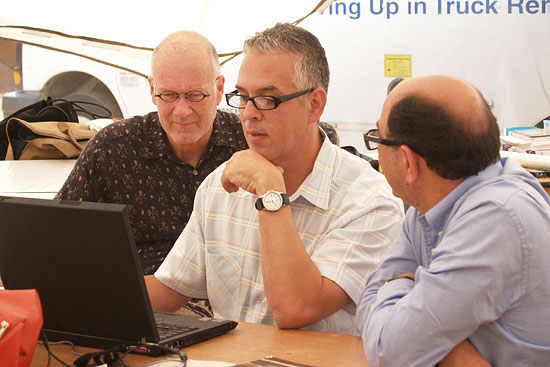
OCTOBER 2007
Jaime Correa
 Jaime Correa (center) prepares for a final presentation at an architectural charrette for Chicken Hill in Asheville, N.C. Assisting him in the preparation is Roberto Behar from R & R Studios (right) and local architect Michael McDonough. |
Jaime Correa is one of those persons who can make you burst out with laughter one moment, then make you almost uneasy with the depth of his intellectual pursuit and the fervor of his revolutionary spirit.
He has been to the mountaintop -- or gotten damn close to it -- but he can share his knowledge on a human level that makes sense to the simple villager in the foothills.
You get the feeling he approaches each day's task with the weight of the world on his shoulders then unburdens himself by sharing his discoveries with an engaging demeanor that seeks to make you both friend and follower.
The founding partner of Correa and Associates, he also is responsible for teaching and coordinating the renowned program in suburb and town design at the University of Miami School of Architecture where he is the Knight Professor in Community Building.
Suggest that the Correa Report -- a sustainable urbanism newsletter that recently starting publishing -- is a marketing tool and he will reject that notion.
"Its goal is to bring about a conscious awareness of sustainability in our immediate environment," Correa said. "This is not a promotional piece but an educational document; and, as such, it has been received with great enthusiasm by the public, government officials and scholars in the social and design arts and sciences."
Ask Correa how he came to the cradle of new urbanism in Miami and you will get a deep and endearing answer.
"When I decided to leave Colombia and move to Miami in 1980, my intention was not to look for good urbanism, beauty, order, commodity or traditional values," he said. "I came to this city because I fell in love with a powerful yet sweet and tender woman, who eventually became my wife, and whose personal demeanor and beautiful nature awakened my revolutionary spirit."
Correa only partly jests that Andrés Duany hired him for his first architecture job in Miami because of a mutual infatuation with the work of the fabled designer from Luxemburg.
"Léon Krier was my idol and my professional god. He was the person for whom I had built a shrine with flowers and candles; a mythical saint in my own biblical group of characters," he said.
Correa's iconoclastic nature has brought him to and broken him away from the influential firms of Dover Kohl & Partners and Correa Valle Valle.
"Talking about the history of the new urbanism in Florida can be a very painful as well as a very joyful experience for me," Correa said. "A change of paradigm does not come easy. And for those of us in the trenches of the new urbanism, this new paradigm has had its moments of despair, its moments of intellectual isolation, its moments of confrontation and its moments of light when everyone else was in darkness."
Perhaps his simplicity, lack of corporate ambitions, allegiance to family and tireless pursuit of creating true communities has allowed Correa to continue strong bonds despite contrary opinions and business partner break ups.
Correa continues to work shoulder to shoulder with his new urbanism colleagues on the post-Katrina rebuilding of the Gulf Coast. His current focus is on creating a brand of new urbanism that addresses the current environmental predicament with sustainability that goes far beyond LEED certification and green building.
As a thinker, he is a skeptic. As a passionate town builder, he is an evangelist:
"The new urbanism in Florida was neither shallow nor the product of vanity," he said. "If it really pays attention to environmental concerns, it will be considered to be the simplest reminder of what America can be in a non-distant future."
"Florida has become the paradigm! Florida has become the land of opportunity!"
Wright has written for a living for 25 years, with nearly 5,000 published articles. He lives in historic Little Havana and is very active in Miami's urban issues. He and his wife of 20 years also are involved in making new and old towns more accessible for people with disabilities.